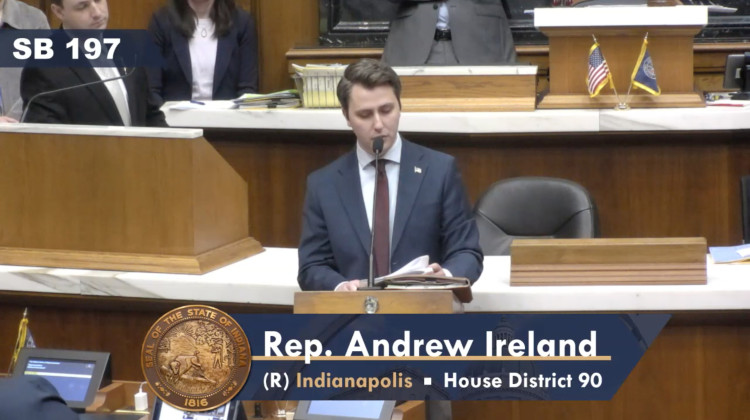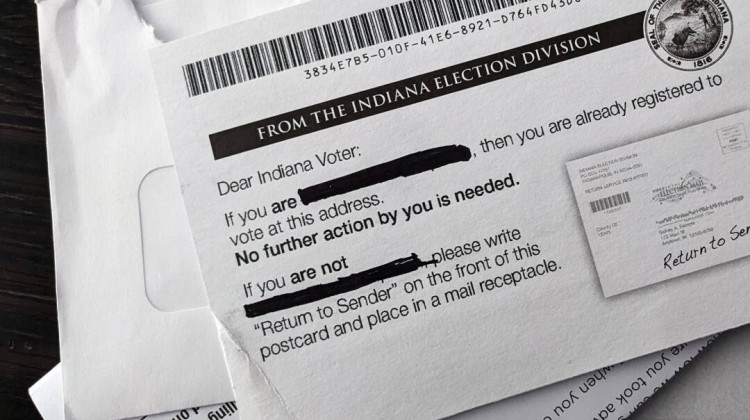
Andrew Ireland (R-Indianapolis), the sponsor of Senate Bill 197, spoke on the House floor in favor of language in the bill that would make it a Class C misdemeanor for someone to sleep on public property. The bill is authored by Sen. Aaron Freeman and Sen. Blake Doriot.
Update: The controversial language was removed from Senate Bill 197 this week. Legislators decided to strike it from the unrelated measure that addresses building safety.
Some are worried the language making it illegal to sleep on public property could still come back in a different bill. On Friday, faith leaders marched a large wooden cross down Market St. to urge lawmakers not to add the language to another bill.
Indiana lawmakers are a step closer to making it illegal to sleep on public property. The House voted to advance a bill that housing advocates say would add additional barriers for people seeking permanent shelter.
Nearly 20 representatives, most against the bill, shared their thoughts before the chamber voted. The bill passed 52 to 40.
“This is a bill grounded in principle,” bill sponsor Andrew Ireland (R-Indianapolis) said. He added that the bill “respects property rights and brings compassion to public safety. It ensures fairness before fines, offers help before punishment and restores dignity through due process.”
Part of Senate Bill 197, which primarily addresses building safety, establishes steps a police officer would follow if someone is residing at a public location.
First, a police officer would decide if someone needs emergency mental health detention. If that isn’t applicable, they would receive a warning and police would offer transportation to a homeless shelter or other services. If that person declines, they would need to leave the premises within one to three days, depending on the location.
But if the person hasn’t moved, beginning July 1, 2026, it would be a Class C misdemeanor if people “use public property of the state or a political subdivision for purposes of sleeping or camping, subject to certain exceptions and conditions.”
A Class C misdemeanor includes a jail sentence of up to 60 days and a fine of up to $500, according to Indiana law.
“We’re trying to assist these individuals,” Ireland said. “This is not to criminalize their behavior, it’s to ensure they get access to the resources they need. But the only way that you could do that is to get them into a squad car in the first place. And the only way you can detain somebody is [if they] have to have a crime.”
Ireland said no one can be cited unless such a facility exists in the first place and is available to receive them.
More than 4,800 people were counted as experiencing homelessness in Indiana last year, according to the Indiana Housing and Community Development Authority.
Some lawmakers believe that limiting where people can stay could prevent deaths to people sleeping outside during extreme weather events and encourage people to get off the streets.
Rep. Garrett Bascom (R-Lawrenceburg) said the bill preserves the dignity of unhoused people with mental health issues by helping them receive services. He said the bill doesn’t start with criminalization when police encounter someone experiencing homelessness
“If they don’t fall under the immediate category of some sort of mental health — if they’re a danger to themselves or others or if they’re gravely disabled — then we attempt to try to get them to services,“ Bascom said. “And if no services are available, then this does not apply.”
But some lawmakers said putting people in jail doesn’t address the mental health crisis within the homeless community. Rep. Vanessa Summers (D-Indianapolis) said the proposed legislation is one of the most heartless bills she’s heard over the 33 years she’s represented her district.
“There are mental issues, there are physical issues — all of those things are going on,” Summers said. “But we have organizations and groups. If we find them, give them money, the time and the people to help, we may be able to eliminate this situation.
There have also been concerns that these arrests could further burden jails that are already struggling to find enough beds and mental health services to support detainees.
A lobbyist with the Indiana Sheriff’s Association previously testified against a different bill this year that had similar language.
Some housing advocates have previously argued that homeless shelters would most likely be saddled with paying the fines that come with the citations — taking away resources that could be used to house people. They also fear it would be even more challenging for someone to receive housing if they have a record.
Rep. Gregory Porter (D-Indianapolis) said many people have jobs, but simply don’t make enough to get off the streets because housing is too expensive.
“I know people who work everyday and can’t find safe, decent and affordable housing. They work everyday, [but] because of the housing crisis we have, they don’t have anywhere to go.”
The bill heads back to the full Senate before moving to the Governor's desk.
Contact Side Effects Public Media and WFYI’s Health Reporter Elizabeth Gabriel at egabriel@wfyi.org.
 DONATE
DONATE






 Support WFYI. We can't do it without you.
Support WFYI. We can't do it without you.